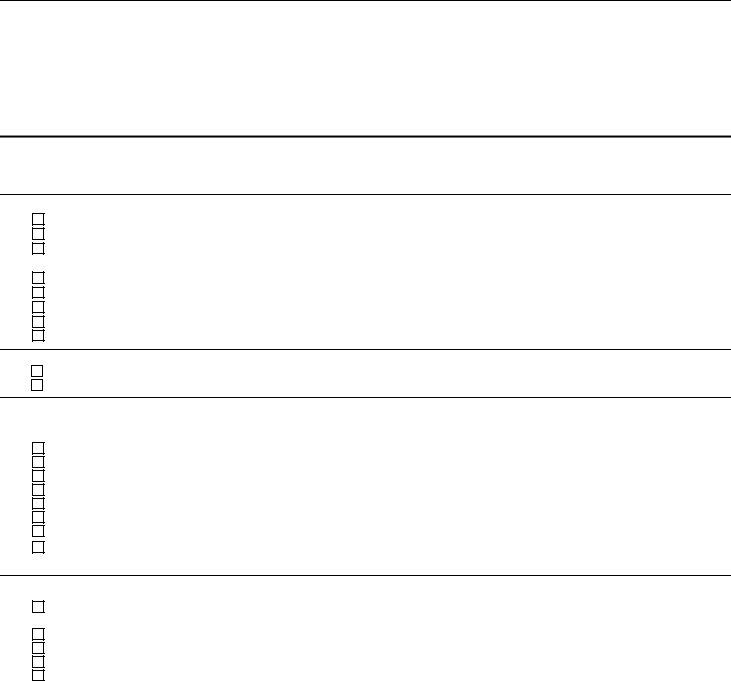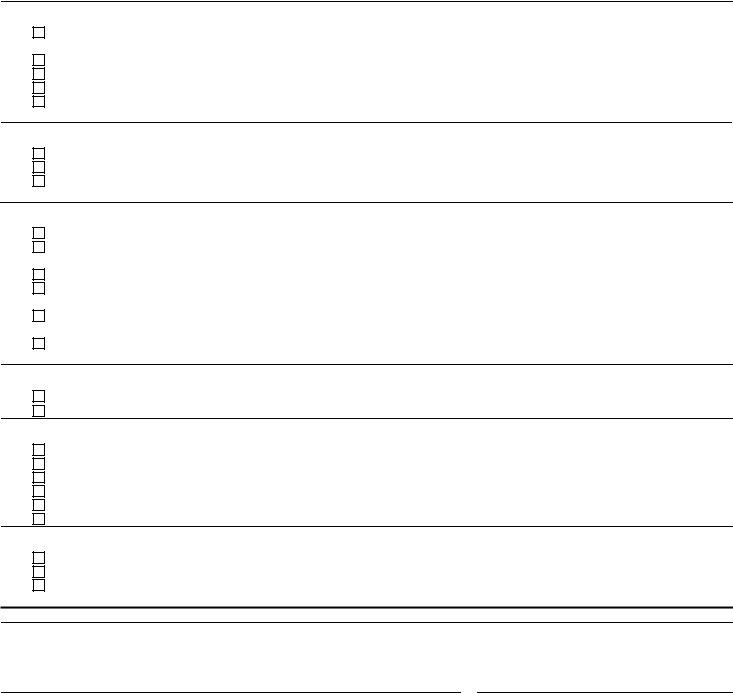In the realm of lead-based paint activities, ensuring the safety of occupants is paramount, as underscored by the Department of Health Services State of Wisconsin's F-00201 form. This form represents a crucial checklist, mandated for every regulated lead-based activity to safeguard human health, particularly in residential settings where the risk of lead exposure could be significant. It outlines a series of steps and precautions that contractors must follow and document, emphasizing the importance of a meticulously crafted Occupant Protection Plan. This plan must be readily available at job sites for inspection, and provided to property owners as well as tenants well before the commencement of any work. It specifies measures for minimizing occupants' exposure to lead dust through strategies ranging from relocation to the use of barriers and daily cleanup processes. Furthermore, it delves into details concerning the safe handling of furniture and the use of restricted work practices to prevent lead contamination. By requiring the lead contractor's certification and a comprehensive approach to occupant safety, the F-00201 form underlines the collective responsibility towards maintaining a safe environment during lead paint abatement or renovation activities. This checklist not only serves to inform and protect the occupants but also acts as a binding document between the contractor and the client, ensuring transparency and accountability in lead hazard management.
| Question | Answer |
|---|---|
| Form Name | Form F 00201 |
| Form Length | 2 pages |
| Fillable? | No |
| Fillable fields | 0 |
| Avg. time to fill out | 30 sec |
| Other names | F00201 lead occupant protection plan form |

DEPARTMENT OF HEALTH SERVICES |
STATE OF WISCONSIN |
Division of Public Health |
Bureau of Environmental and Occupational Health |
DHS 163, Wis. Adm. Code |
OCCUPANT PROTECTION PLAN
Checklist for
1.For all regulated
2.When restricted work practices will be used in conducting any regulated
Provide the Occupant Protection Plan to the property owner and all occupied dwelling units with direct access to work areas at least 2 days before starting the activity.
Deliver the document and keep a signed copy for company records.
The Occupant Protection Plan can be delivered to each dwelling unit by mail if sent by certified mail at least 7 days before the start of this activity.
Name of Occupant(s) (List property owner’s name if unit is not occupied)
Address |
Unit Number (if applicable) |
||
|
|
|
|
City |
|
Zip |
|
|
WI |
|
|
|
|
|
|
Lead Contractor Name |
DHS Certification Number |
Contractor Telephone Number |
|
|
|
( |
) |
Project Date(s) (mm/dd/yy) |
|
|
|
OCCUPANT PROTECTION PLAN CHECKLIST FOR
This is a checklist of actions the contractor will take to protect the occupant, while paint is disturbed. Occupants must stay out of work areas while work is in progress. The contractor will do daily
Occupant Location (Check all that apply)
Unit is vacant (no movable objects remain in the unit; i.e. stove, refrigerator).
Occupants will be relocated and out of the unit until the lead project is done.
Occupants will not be allowed within the work area before project completion, including clearance with documented dust wipe sample results.
Occupants will not be allowed within the work area before project completion, including mandatory visual clearance.
Occupants will be outside the dwelling during work times but may return each day after clean up.
Occupants will have
Occupants will be provided a
Furniture (Check all that apply)
Will inform Occupant(s) to remove all personal items and as much furniture as possible from work area before work begins. Will cover with plastic all furniture and personal belongings that cannot be removed.
Containment and Barrier System (Check all that apply)
Interior Work
Will use a dust room for work on removable components such as windows and doors.
Will use an airlock flap on all doorways to work areas
Will use plastic to cover floor extending 5 feet beyond work area in all directions and where it is practical. Workers will stay on plastic.
Will inform Occupants to keep off of plastic in work area.
Will lock or firmly secure work area to provide an overnight barrier.
Will post warning signs at entry to each room where work is being done, or will post warning signs on the building exterior near main and secondary entryways.
Exterior Work (Containment and Barrier System continued)
Will remove all movable items (playground equipment, toys, sandbox, patio furniture, etc.) to a distance of 20 feet from work area or seal these items with plastic and tape.
Will use plastic sheeting or landscape fabric on the ground extending 10 feet from building, where practical. Will keep all windows, including windows of adjacent dwellings, within 20 feet of work closed.
Will erect barrier tape or temporary fencing to make a

Exterior Work (Containment and Barrier System continued)
Will remove all movable items (playground equipment, toys, sandbox, patio furniture, etc.) to a distance of 20 feet from work area or seal these items with plastic and tape.
Will use plastic sheeting or landscape fabric on the ground extending 10 feet from building, where practical. Will keep all windows, including windows of adjacent dwellings, within 20 feet of work closed.
Will erect barrier tape or temporary fencing to make a
Window Work
Will tape plastic to exterior wall when removing windows from the inside.
Will tape plastic to interior wall when removing windows from the outside.
Will use plastic sheeting or landscape fabric on the ground under the windows.
Restricted Work Practices (Check all that apply)
Will use a heat gun, not to exceed 1100 degrees Fahrenheit.
Will use machine planer, chipper, grinder, or sander that is attached to a properly operating
Will use chemical paint stripper to remove
Will remove components such as complete door systems, siding, walls, cabinets or trim. Will use containment to isolate areas where paint is being disturbed from the rest of the property.
Will use abrasive blasting or sandblasting. Will use containment to isolate areas where paint is being disturbed from the rest of the property while using either of these practices.
Ventilation System (Check all that apply)
Will turn off system and seal all vents in workroom with plastic.
Will turn off system and seal off vents within 5 feet of the work area.
Daily Cleaning (Check all that apply)
Will remove debris from dwelling or store it in a locked secure area.
Will clean all horizontal surfaces in the work areas with a HEPA vacuum and wet washed. Will clean and remove plastic walkways each day.
Will clean all walkways that are used as pathways to the work area with a HEPA vacuum. Will clean if containment is breached on both sides of the containment.
Will clean off debris, fold, and secure all plastic sheeting or landscape fabric overnight but may use again the next day.
Final Cleaning (Check all that apply)
Will remove all debris and visible dust.
Will HEPA vacuum; wet wash and HEPA vacuum all horizontal surfaces and trim in work areas.
Will HEPA vacuum, wet wash, and HEPA vacuum all surfaces and floors extending at least 5 feet in all directions from treated surface.
LEAD CERTIFIED CONTRACTOR
I certify that a copy of the Occupant Protection Plan was provided to the property owner or occupant(s) of the property address listed on this form on this date __________________________ by way of ______________________________ (describe delivery method).
SIGNATURE – Certified Lead Contractor |
Date Signed (mm/dd/yy) |
|
|
|
|
For more information, contact the Asbestos and Lead Section at the information below |
|
|
|
|
|
Mailing Address |
Department of Health Services |
|
|
Asbestos and Lead Section, Rm 137 |
|
|
P.O. Box 2659 |
|
|
Madison WI |
|
Telephone Number |
(608) |
|
Fax Telephone Number |
(608) |
|
Website Address |
http://dhs.wisconsin.gov/lead |
|